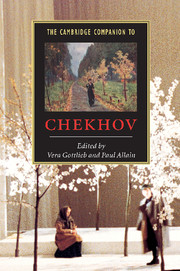Book contents
- Frontmatter
- Part 1 Chekhov in context
- Part 2 Chekhov in production
- 4 From Platonov to Piano
- 5 Chekhov's one-act plays and the full-length plays
- 6 Ivanov: the invention of a negative dramaturgy
- 7 The Seagull: an adaptation
- 8 Notes from a director: Uncle Vanya
- 9 Notes from a director: Three Sisters
- 10 The Cherry Orchard
- 11 Acting Chekhov: 'a friend to the actor'
- 12 The scenography of Chekhov
- 13 Chekhov on screen
- 14 Chekhov on the Russian stage
- 15 Directors' Chekhov
- Part 3 Chekhov the writer
- Appendix 1 Chekhov's works: primary sources from the Russian - Variations of English titles from the Russian
- Appendix 2 Selected stage productions
- Appendix 3 Selected screen versions
- Appendix 4 Illustrations
- Selected bibliography
- Index of Works by Checkov
- General Index
5 - Chekhov's one-act plays and the full-length plays
from Part 2 - Chekhov in production
Published online by Cambridge University Press: 28 May 2006
- Frontmatter
- Part 1 Chekhov in context
- Part 2 Chekhov in production
- 4 From Platonov to Piano
- 5 Chekhov's one-act plays and the full-length plays
- 6 Ivanov: the invention of a negative dramaturgy
- 7 The Seagull: an adaptation
- 8 Notes from a director: Uncle Vanya
- 9 Notes from a director: Three Sisters
- 10 The Cherry Orchard
- 11 Acting Chekhov: 'a friend to the actor'
- 12 The scenography of Chekhov
- 13 Chekhov on screen
- 14 Chekhov on the Russian stage
- 15 Directors' Chekhov
- Part 3 Chekhov the writer
- Appendix 1 Chekhov's works: primary sources from the Russian - Variations of English titles from the Russian
- Appendix 2 Selected stage productions
- Appendix 3 Selected screen versions
- Appendix 4 Illustrations
- Selected bibliography
- Index of Works by Checkov
- General Index
Summary
There is a paradox about Chekhov's one-act plays: although performed as frequently as Pinter's short plays, or Beckett's - and given the much longer period of time since their creation - much less has actually been written about them.
This may be due to Chekhov's own dismissive estimation of them as 'amusing trifles', and because critics have tended to concentrate on his major works. There is, however, a marked correlation between the one-act plays and the major plays (and equally some of the short stories). This relates to the use of comic techniques, to the inversion of 'stock' conventions, to his characterisation, and the extent to which action arises from character, rather than plot. It is in some of the short plays that one may see the absence of plot, and the developing use of action which, characteristically Chekhovian, is motivated by internal - and often subtextual - characterisation and dialogue. The short plays require redefinition within the context of the theatrical conventions of the time and as a major and serious part of Chekhov's achievement.
- Type
- Chapter
- Information
- The Cambridge Companion to Chekhov , pp. 57 - 69Publisher: Cambridge University PressPrint publication year: 2000
- 3
- Cited by

